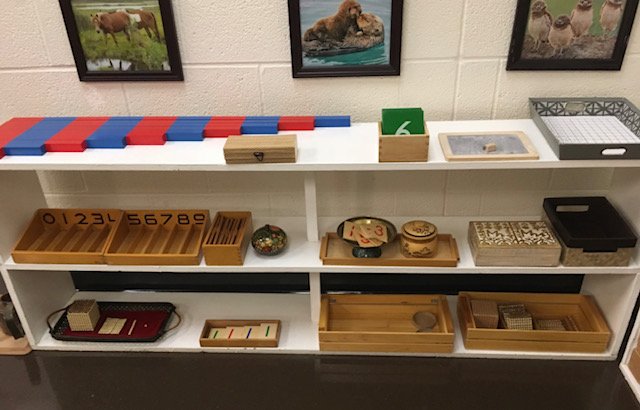Beginning, middle, and end
Maria Montessori applied the scientific method when she pioneered a new educational model that would outlive her. She spent years observing children and how they learned within a prepared environment.
One of the things she observed is that there is a natural beginning, middle, and end to a child engaging with a material or “work” as she called it.
Any new child in a Montessori classroom will be taught this pattern to how they go about their days and approach their work. It provides a sense of order to the learning process.
Beginning
A child takes a mat and unrolls it on the floor. She approaches the shelf and chooses which work she will use. She takes the work off the shelf and brings it to her mat.
Photo by Audrey Donnell
Middle
The child brings focus and concentration as she uses the work until she has completed that particular work. In the early years—ages 1, 2, and 3—children work independently. No one is allowed to use the work until she has finished it, unless she agrees. Her concentration is thereby guarded so her brain can make the necessary connections while she engages with the work.
Photo by Audrey Donnell
End
The child puts the work back on the tray, returns the work to the shelf, and rolls up her mat and puts it back in the corner.
_________________________________________________
This progression of beginning, middle, and end, shows up in many places in life. You certainly see this unfold in the natural world, with the rising and setting of the sun. With the change of seasons. With a vegetable plant coming up in the garden.
We can view our lives and careers through this lens as well.
Your days
Throughout your day, there are many tasks that you perform that have a beginning, middle, and end. Making breakfast. The commute to school or work. Meetings. The workday itself.
Projects at work
Projects, by definition, are discrete, and have a beginning and an end (and therefore, a middle).
The lifespan of your job
Jobs you hold have a beginning, a middle, and an end. They fit together to form the larger picture of your career.
Your career
Even your career has a beginning, middle and end. You are at a particular phase of your career at this very point in time, and it won’t look the same in a few years because you will be in a different phase.
The middle can have ups and downs. It is often career transitions that people I work with begin to reevaluate or in some cases evaluate for the first time what it is they truly want for their careers. And often major life transitions stir up new priorities and values that shift what matters most to you in a career.
Relationships
Do relationships have a beginning, a middle, and an end? You may not often think about ending relationships, but in some cases, ending can be exactly what is needed.
Disordered or incomplete beginning, middle, end
There is actually great comfort in having a beginning, middle, and end to these various aspects of our lives. But what happens when we don’t have a proper beginning, and skip right to the middle? Or when the middle drags on longer than it should, and we never bring to completion something that truly should end?
Have you ever been to a meeting that didn’t have a proper introduction or agenda presented? It can be a total disaster.
*True confession* I am guilty of starting projects and not finishing them. It doesn’t serve me or the people around me.
Have you ever stayed in a job longer than you should have? Perhaps in denial that the job had reached the end of its useful life?
Or maybe you find yourself mid-career and realize you’re going through the motions but not really engaged at work. You’re missing the focus and concentration that a 3-year-old does naturally. You’re in the middle but if you’re honest you’re not really in it at all.
What the beginning, middle, and end of work does for a 3-year-old is allow her to complete the learning process. And it also safeguards what comes completely naturally to her—joy, concentration, and a sense of accomplishment. These 3 barometers may not be present for her if the beginning, middle, and end are disordered or incomplete.
If you used these barometers—joy, concentration, and a sense of accomplishment—to indicate what’s right about your life or what’s missing, what would you learn? Where do you need a beginning, middle, or end in life at this moment?
I’d love to know.
Love,
Audrey


